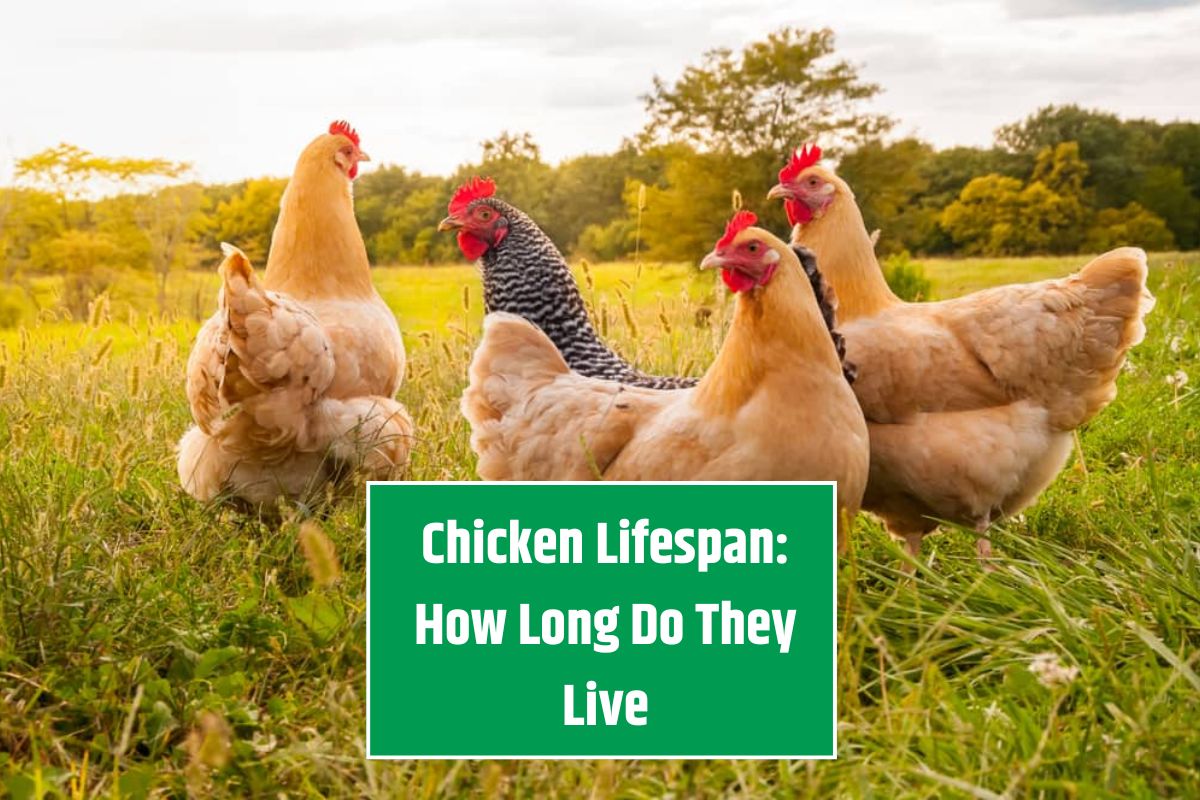Chickens can live surprisingly long lives with proper care, even though they are naturally prey animals with shorter life expectancies. From genetics and breed type to diet and environment, various factors influence how long your chickens will thrive in your backyard. Here’s everything you need to know about the lifespan of chickens and how to ensure your flock lives a long and healthy life.
What is the Average Lifespan of a Chicken?
On average, chickens live for about 5 to 10 years. However, a chicken’s breed plays a significant role in determining its lifespan. Here are the average lifespans of some common chicken breeds:
- Isa Browns: 2-3 years
- Rhode Island Red: 5-8 years
- Plymouth Rock: 8-10 years
- Silkie: 7-9 years
- Orpington: 8-10 years
- Leghorn: 4-6 years
- Wyandotte: 6-12 years
- Australorp: 6-10 years
- Cochin: 8-10 years
- Easter Eggers: 8-10 years
Even within the same breed, lifespan can vary based on genetics, diet, and environment. Chickens bred for egg or meat production typically have shorter lives, while heritage and landrace breeds are known for their longevity.
Lifespan vs. Productive Lifespan
It’s important to differentiate between lifespan and productive lifespan:
- Lifespan: The total years a chicken can live.
- Productive Lifespan: The period when a chicken is at its peak for egg production.
Most chickens have a productive lifespan of around 2-3 years, but they can live much longer, often remaining active members of the flock even after their egg production decreases.
Lifespan of Roosters vs. Hens
- Roosters generally live about 5-8 years, similar to hens of the same breed.
- Risks for Roosters: Protective roosters often face more risks from predators as they defend the flock. Friendly roosters are more likely to live longer, as aggressive behavior can lead to their removal or isolation.
Chicken Breeds and Their Lifespans
1. Hybrid Chicken Breeds (3-5 Years)
- Examples: Isa Browns, Cornish Rocks
- Characteristics: Bred for rapid growth and high production, hybrid chickens have shorter lifespans. They are prone to health issues like organ failure and are typically replaced after 2 years in commercial settings.
2. Dual-Purpose Breeds (6-8 Years)
- Examples: Austra Whites, Sapphire Gems
- Characteristics: These chickens are bred for both eggs and meat. They mature at a moderate rate and generally have a healthier lifespan than hybrids.
3. Heritage Breeds (8-10 Years)
- Examples: Australorps, Rhode Island Reds, Plymouth Rocks
- Characteristics: Heritage breeds grow slowly and have more robust genetics, contributing to longer lifespans. They are less susceptible to diseases and stress-related issues.
4. Landrace Breeds (10+ Years)
- Examples: Icelandic chickens, Swedish Black Hens
- Characteristics: These breeds develop naturally in specific regions, making them hardy and adaptable. Their undiluted gene pool gives them strong immune systems, contributing to extended lifespans.
Factors Affecting Chicken Lifespan
1. Diet
- A balanced diet is essential for a chicken’s health and longevity.
- Provide high-quality layer feed, clean water, and supplemental grit.
- Avoid nutritional deficiencies that can weaken the immune system.
2. Environment
- Chickens raised in natural, spacious environments tend to be healthier.
- Exposure to fresh air and sunlight helps chickens build natural immunity to environmental pathogens.
3. Genetics
- Good genetics promote strong immunity and resistance to diseases.
- Breeders who focus on pure lines and healthy birds can increase the longevity of their chickens.
4. Free-Ranging vs. Confinement
- Free-Range: Encourages natural foraging, exercise, and mental stimulation. However, it increases the risk of predator attacks.
- Confined Environments: Offer protection from predators but may lead to boredom and stress if not properly managed.
5. Veterinary Care
- Regular health checks, access to veterinary care, and basic first aid are crucial.
- Treating illnesses promptly can extend a chicken’s lifespan.
6. Disease Prevention
- Common Diseases: Marek’s disease, coccidiosis, and external parasites can shorten a chicken’s lifespan.
- Biosecurity Measures: Regular cleaning, quarantining new birds, and reducing contact with wild birds can minimize disease risks.
Tips to Help Your Chickens Live Longer
1. Provide a Balanced Diet
- Feed age-appropriate, nutritious feed to support growth, egg production, and overall health.
- Add grit for digestion and offer occasional healthy treats.
2. Create a Safe Environment
- Predator-proof the chicken coop and yard with secure fencing and sturdy housing.
- Offer adequate space for each bird to reduce stress and prevent bullying.
3. Maintain Good Genetics
- Choose breeds known for their hardiness and disease resistance.
- Purchase from reputable breeders who focus on the health and longevity of their chickens.
4. Monitor Health Regularly
- Conduct monthly health checks for signs of illness, injury, or parasites.
- Quarantine sick or injured birds to prevent the spread of disease.
5. Ensure Proper Housing
- Provide ample coop space, roosting bars, and nesting boxes.
- Make sure the coop is well-ventilated but protected from harsh weather conditions.
6. Implement Biosecurity Measures
- Don’t share equipment with other chicken keepers to prevent disease transmission.
- Limit your flock’s contact with wild birds and clean the coop regularly.
FAQ’s
1. How long do chickens live on average?
Chickens typically live between 5-10 years, depending on their breed, environment, and care.
2. Do certain chicken breeds live longer?
Yes, heritage and landrace breeds generally live longer than hybrids and production breeds.
3. What is the difference between lifespan and productive lifespan?
Lifespan is the total years a chicken can live, while productive lifespan refers to their peak egg-laying years.
4. Can roosters live longer than hens?
Roosters can live just as long as hens, but their protective behavior may put them at higher risk of predator attacks.
5. How can I prevent diseases in my flock?
Practice good biosecurity, maintain a clean coop, and provide a balanced diet to boost immunity.

















